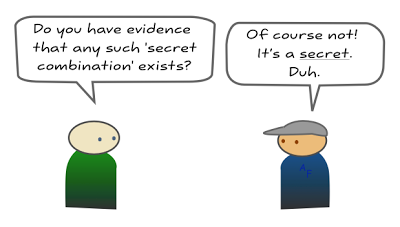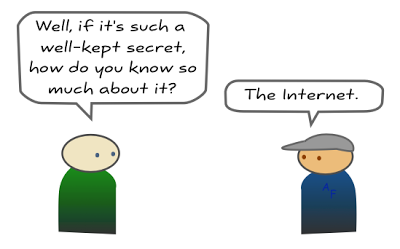I ran across two similar articles the other day. One’s about religion, one’s about politics, and both are taking me to task.
Must science declare a holy war on religion?
The so-called New Atheists are attacking the mantra of science and faith being compatible. Others in the science community question the value of confrontation.
Ooo, confrontation. Sounds confronting. It seems that atheist scientists are being mean, publishing books, and loudly declaring that God probably doesn’t exist. Doing science, in other words.
And then there’s this article:
Are liberals seceding from sanity?
The left is crazy to insult white Southerners as a group
which takes liberals to task for South-bashing, and the only example offered is Kevin Drum. But never mind. The article warns us:
They are erring neighbors to be won over, not cretins to be mocked.
At which point I ask: Is it too much to ask for both?
Let’s examine the question that ties these two articles together: how do we act toward people who disagree with us? And there are at least two possible answers:
- Be nice, keep quiet, persuade them with reason, and sooner or later they’ll come around if we don’t hurt their feelings and (all together now) alienate them.
- Be loud and proud, combat the ridiculous with ridicule, the error with truth, and don’t worry overmuch about stepping on toes.
Now let’s see: where have I heard this conflict before? Ah, yes. It was Amy Sullivan, who warned us that Democrats needed people of faith to win elections. She couldn’t have known how badly that would work for Republicans, who herded the faithful into their tent, only to find that they couldn’t get rid of them. Now the delusional folk are wanting to run the whole show, with predictably disastrous consequences.
So let’s address the religion article first. And just for perspective: these articles ran on the same day as these news stories:
Dozens of rabbis fly over Israel praying to defeat swine flu
The aim of the flight was to stop the pandemic so people will stop dying from it,” Rabbi Yitzhak Batzri was quoted as saying in the mass-circulation daily Yedioth Ahronoth.
“We are certain that, thanks to the prayer, the danger is already behind us,” added Batzri.
Mayoral Candidate Mary Falling Wants Creationism Exhibit
TULSA, OK — A mayoral candidate has resurrected a controversy over Creationism at the Tulsa Zoo.
A push to exhibit the Christian story of creation at the Tulsa Zoo failed four years ago. Republican candidate for Tulsa mayor, Anna Falling, is bringing the issue front and center.
It’s the same exhibit and the same arguments, but now it is given from the bully pulpit of a candidate running for mayor.
“Some may ask why this issue during a Mayoral campaign? And I say why not?” said candidate Anna Falling.
For Anna Falling, the road to city hall runs through the Tulsa Zoo. She’s made her Christianity central to her platform and now the exhibit depicting the Christian story of Creationism is her first campaign promise.
“Today we are announcing that God will be glorified in this city. He shall not be shunned. Upon our election, we hereby commit to honoring Him in all ways that He has been dishonored,” said Anna Falling.
These people live in the same century as we do. They have access to all the same knowledge that we do. The Enlightenment was 400 years ago. Sweet reason has had all that time to do its work. The non-confrontational approach has failed. They’re still here, dumber than ever, and trying to take over the world that science has created. By not confronting them, by not speaking out, we will let them win.
On the other hand, by speaking out, by coming out and being heard, by being loud and obnoxious and, yes, confrontational, we have seen our numbers grow. More people now identify as non-religious than at any time in recent history.
If my reading is representative, most of these gains are coming from people who haven’t been religious for a long time, but were reluctant to call themselves atheists or agnostics. For these people, all the noise about religion has forced the issue, and pushed them to re-examine their beliefs. It may have pushed some other people the other way, this is true, but those people probably weren’t convincible anyway. The only people I see complaining about noisy atheists are Fundamentalist Christians — and why wouldn’t they.
See, when you’re in a religion, it’s like you’re in a bubble. A big cushy bubble where it’s nice and soft, and everyone reaffirms your beliefs. And it feels goood. Now someone comes and gives your bubble a push. You have two choices. If you’re a confirmed believer, you retreat further into the bubble. That makes the noise stop. Drat those noisy people! Why must they challenge you? It certainly didn’t make you change, but then what were the odds of that happening? On the other hand, if you’re someone who makes reality your guide, that noise (plus the cognitive dissonance you already have floating around in there) may be just the thing that forces you to see how the facts conflict with what’s going on in your bubble. And when that gets loud enough, you might decide to burst your bubble and change your thinking.
But that only works when it’s obvious that there’s a disconnect between your bubble and the real world. So I’d say that when you have the facts on your side, your cause can only benefit from pushing the facts.
Now what about the South-bashing? This is trickier because while the US South has a definite inclination toward the most dangerous kind of lunacy, I’ve read comments from loads of people in the South who are progressive, and who feel annoyed and embarrassed by the attitudes of their neighbours. So I don’t engage in South-bashing. I’m not a big fan of stereotyping. Not very accurate. But I’ll gladly take on the lunacy. People who are convincible aren’t too crazy about the crazy anyway.
And this is what I think both authors miss: people are different. That is, some people are crazy, and some people are convincible, and they are not the same people.
You can take on the crazy with mockery and ridicule. They won’t like it. But the convincible will notice that you’re making sense. They’ll thank you for it. And all you have to do is tell the truth and tell it loud.






Recent Comments